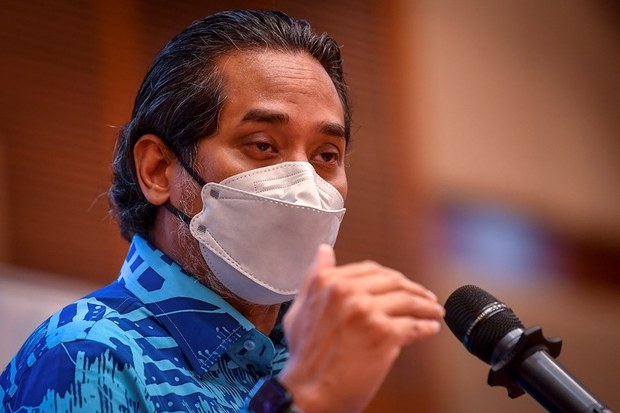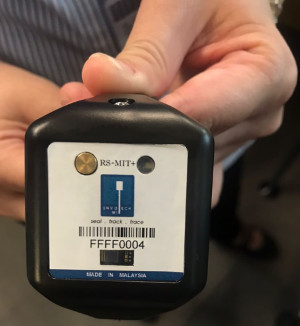Malaysia: South African Student Infected with COVID Omicron Variant
2021.12.03
Putrajaya, Malaysia
 Health Minister Khairy Jamaluddin tells reporters about Malaysia’s first identified case of the COVID-19 Omicron variant, in Putrajaya, Dec. 3, 2021.
Health Minister Khairy Jamaluddin tells reporters about Malaysia’s first identified case of the COVID-19 Omicron variant, in Putrajaya, Dec. 3, 2021.
Malaysia has confirmed its first case of the new Omicron variant of COVID-19, Health Minister Khairy Jamaluddin said Friday, as the nation became the second one in Southeast Asia after Singapore to detect the presence of this strain.
He also announced that international travelers in Malaysia who face a high risk of contracting the virus would be required to wear digital tracking devices during their quarantine so health authorities could monitor that they are obeying movement restrictions.
“The case was detected after the authorities re-tested earlier 74 positive samples taken during screening at the Kuala Lumpur International Airport (KILA) between Nov. 11 and 28 following the World Health Organization’s designation of Omicron as a variant of concern,” Khairy told reporters in Putrajaya.
The health minister said genome sequencing on Dec. 2 confirmed the variant in a 19-year-old private university student who had returned to Malaysia after visiting her family in South Africa. She arrived via Singapore on Nov. 19, days before South Africa reported the first detected case of Omicron on Nov. 24.
The student tested positive during a COVID-19 screening upon her arrival at KLIA and quarantined at a residence provided by the university in Perak state where she studies, Khairy said.
She and eight of her close contacts who had tested negative in the first two screenings would be called on to undergo another COVID-19 test since the case was detected days before WHO’s announcement about the Omicron variant.
“The woman was fully vaccinated with the Pfizer vaccine on Sept. 29 and was asymptomatic throughout her 10-day quarantine period until Nov. 29,” Khairy said.
Neighboring Singapore reported its first two cases of the new strain on Thursday. The Omicron variant has been found in 30 nations in a little more than a week.
‘Follow protocols’
Noting the emergence of Omicron, Khairy urged people to keep following COVID-19 protocols. These include wearing face masks while in public and following the set rules to facilitate contact tracing, in case of an outbreak.
“In this particular case, we managed to track down the student’s travel records in just an hour,” he said.
“This is why checking in is important, as it allows us to trace and find close contacts of a person who has tested positive,” he said, referring to the MySejahtera mobile phone application that authorities use to update and track COVID-19 infections.
The student, in this case, had followed rules as MySejahtera records show she did not leave her place of quarantine, he said.
Earlier this week, Malaysia temporarily banned the entry of travelers from eight Southern African countries.

On Friday, Khairy also announced that travelers who arrive at the Kuala Lumpur airport from countries deemed COVID-19 high-risk would be monitored using digital tracking devices, adding that the health ministry would release the list of those nations later.
“They are required to wear digital tracking devices throughout their home surveillance and quarantine periods,” he said.
Malaysian health authorities have been using such devices to track people arriving from overseas considered at high risk of not sticking to COVID-19 quarantine protocols.
Khairy said that the Vaccinated Travel Lanes initiative between Malaysia and Singapore would continue with an additional requirement that travelers need to get tested for COVID-19 on the third and seventh day after arrival.
In a statement on Nov. 28, the WHO noted that it was not clear whether the Omicron variant was more transmissible than the Delta and other COVID-19 variants, or if it causes more severe infections.
Nations are to report initial cases or clusters to the WHO and to perform field tests and laboratory assessments “to better understand if Omicron has different transmission or disease characteristics, or impacts effectiveness of vaccines, therapeutics, diagnostics or public health and social measures,” the U.N. health agency said in the statement.
‘Be vigilant’
Koh Kar Chai, the president of the Malaysian Medical Association, said the nation should be able to deal with the new variant.
“We should not panic, as not much is known as yet about Omicron, but we should always be vigilant and practice standard operating procedures as well as ensure that we have got our booster shots,” he told BenarNews.
Koh said he was confident that with the experience of handling the pandemic since early 2020 and with political leadership and responsible society, the country could weather the storm. He also dismissed potential calls to close the country’s borders because Omicron had now reached Malaysia.
“Experience has shown us that the closing of borders is no guarantee that we will keep Omicron out. Best would be to have tight public health measures at the country’s entry points,” he said.
Malaysia on Friday reported 5,551 new COVID-19 cases, bringing the total number of cases in the country to nearly 2.65 million since the pandemic began, while more than 30,000 people have died after being infected.
Meanwhile, the health ministry has reported that 97 percent of Malaysia’s adult population – about 22.7 million people have been fully vaccinated against the virus.







